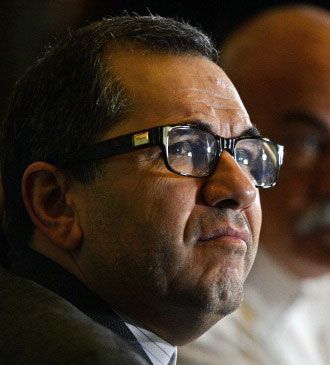Interview: Iranian Deputy Foreign Minister Majid Ravanchi
By Ariane Tabatabai | June 30, 2015

I had an opportunity to sit down with Iran's deputy foreign minister and one of Iran’s chief negotiators, Majid Ravanchi, in the Coburg Hotel in Vienna, Austria, where the P5+1 (the five permanent members of the UN Security Council, plus Germany) and Iran are working around the clock to strike a nuclear deal that would curb Tehran's nuclear activities and provide assurance of their peaceful nature, while granting Iran relief from international economic sanctions. I asked Ravanchi about the state of play in the negotiations and the stumbling blocks on the path toward a final deal. The deputy foreign minister also shed some light on domestic aspects of the Iranian nuclear negotiations.
Tabatabai: There are some rumors floating around the lobby of the Marriott Hotel across the street (where journalists and analysts congregate) about whether or not the P5+1 have added some elements to the discussions since Lausanne. What's your take on this? Is everyone still negotiating within the framework of Lausanne?
Ravanchi: What we reached there was a sort of understanding, not agreement, some sort of solution to the problems. This has been the point of departure. We have been working under the umbrella of this general understanding. But I have to say, we didn't have time to go into detail about all subjects in Lausanne. So, with our partners, we have been working to see if we can resolve issues important to both sides. If you talk in general terms, you can agree upon things more or less quickly. When you enter details, it takes more time. Some times, you have to insist. Therefore, it is not an easy job to get to the bottom of everything quickly. But we are following the logic of Lausanne.
Tabatabai: What about the remaining issues then? Are they more political or technical you'd say?
Ravanchi: I'd say both: There have been problems associated with issues on both fronts. I don't want to go into detail here because of how sensitive this stage is, but on both general topics, nuclear and sanctions, there are still technical problems that need to be solved. And to be frank, there are also political decisions that need to be made.
One other point I should emphasize here is that in Lausanne we went into a lot of detail on the nuclear side. We also discussed sanctions, but compared to what we achieved on the nuclear issue, we didn't get as far. So, this is now of paramount importance. And as I said, if we are going further into detail on the nuclear issue, we need to also do the same on the sanctions issue.
Tabatabai: Speaking of the political side of things, how do you see the role of Majles [the Iranian consultative assembly, or parliament] in the process?
Ravanchi: You know, a few days ago, the Majles adopted a bill ratified later by the Council of Guardians. We don't need their approval, but the agreement has to be submitted to the Majles by the Foreign Ministry and every six months, the Foreign Ministry had to present an updated report to the parliament. There are other provisions in [the] deal. For instance, we have to work within the framework set up by the Majles. The Majles is very active on this. The ratification of the Additional Protocol [to the International Atomic Energy Agency Safeguards Agreement] has to go through parliament, and we believe that even besides the ratification of the AP, even the provisional implementation should have the blessing of the parliament. As the government, we have to listen to the Majles, and they give us the framework to operate within.
Tabatabai: So, how do you assess Iran's ability to implement the deal?
Ravanchi: If there is a deal, it should be a good deal. This is something we all want, not just Iran. This needs to fall within the framework set for us by both the Supreme Leader and Majles. In that case, the implementation will go smoothly.
Tabatabai: The Supreme Leader's recent comments about visits to military sites have raised a number of questions on this in the United States. Can you get into a bit more detail on monitoring under the Additional Protocol and also the issue of managed access versus inspection in military facilities?
Ravanchi: First of all we have to see what Iran's international obligations are under. We have a Safeguards Agreement with the [International Atomic Energy] Agency based on which we've been operating for many years. There haven't been any issues with that instrument. There is also the Additional Protocol. We implemented it for more than two years between 2003 and 2005. The agency had a free hand to go over different places in Iran at their choosing, and there were not any problems at all with the places the agency wanted to see or the places it wanted to talk to. So, as far as our record in the implementation of the [Additional Protocol] goes, in those years where we voluntarily implemented the AP, there was not a single problem. The inspectors did their job in Iran. But also, Iran has given access to its military facilities under the Chemical Weapons Convention. So, we don't have an issue with honoring our obligations in accordance with our international legal obligations.
Now we are entering a new phase. If we are going to reach a final deal, this deal is going to include the AP. We have included in the text voluntary implementation of the AP. This will be until a later stage, where it should be ratified by the Iranian parliament. This means it will become part of Iran's national laws. So, if we reach an agreement, Iran will abide by the AP, which also entails managed access.
So if you're referring to recent developments and questions about whether or not Iran will provide managed access, you can't just discuss them in a vacuum. You have to see where and in what context these issues were raised. If you remember, when a sort of understanding was reached in Lausanne, this idea of Iran providing access to its military sites at all time, in any location, any site was raised. This has created some kind of anxiety in Iran on the actual purpose of all this. So, is this about the deal, or is it about seeing what's going on in the Iranian military? We will not allow anybody to enter the military complexes, because the AP isn't about letting inspectors visit and have a free hand in wherever they want to go, whatever they want to do, and talking about whoever they want to talk to. The AP is about providing access to certain areas where there is proof that there have been some alleged wrongdoings, the documents of which should be given to the members.
I don't think there will be any problem in the future on the implementation of the AP. You know, this is about exceptional cases, not just any case. Of course, this makes people nervous. I can't imagine the United States for instance allowing this. It's not just Iran being sensitive; no country will just open up its [military] facilities. And Iran is not an exception. We've tried to make the agency's job easier, given daily access to inspectors.
Tabatabai: So, to continue with topics covered by the Supreme Leader's recent comments and generating a lot of discussion here obviously: Can you explain where Iran stands and thinks about sanctions relief? Does the Supreme Leader mean sanctions must be lifted the second a deal is reached, as many seem to think?
Ravanchi: From the beginning of the negotiations, we have been insisting on the fact that whatever we do should be in line and proportionate to whatever the other side has to do. I don't mean that whatever Iran does on the nuclear has to be done by the other side, of course. But we can't be expected to do our job, meet our obligation, and then wait for the other side to meet theirs. So there needs to be some proportionality here, and we have told our P5+1 partners that Iran is ready to take a number of steps on the nuclear issue (the work in Fordow, Natanz, or Arak, whatever we agree upon), at the first stage, provided we get the assurance that the other side (the US and European countries) do their end. We are still talking about all this. But this issue [is] of simultaneity—that Iran will have to do its share, and simultaneously they have to do their share. But it can't be based on a principle of the other side waiting until we are done and then deciding what needs to be done. So this issue of simultaneity is something we've insisted upon, and I think our colleagues have understood this. They are in the same line of thinking as we are, and I think this can be solved.
Tabatabai: How do you foresee a deal (or no deal) affecting your administration?
Ravanchi: You know, we have been very sincere with everyone. If there's a deal, it'll be in our interest, the interest of the region, the P5+1. It is really an artificial crisis. But a deal needs to be good to be sustainable. At the same time, if there's not deal, it won't be the end of the world. The present administration is trying to step away from reliance on oil in its economy, so that it can stop being hostage to the price of oil. So, in the next few years, we hope to make that reliance go down to zero. We know it'll be very difficult. No one can deny that not having foreign exchange is difficult. But we think it's worth it to have a good deal, and if not, we'll rely on ourselves.
Together, we make the world safer.
The Bulletin elevates expert voices above the noise. But as an independent nonprofit organization, our operations depend on the support of readers like you. Help us continue to deliver quality journalism that holds leaders accountable. Your support of our work at any level is important. In return, we promise our coverage will be understandable, influential, vigilant, solution-oriented, and fair-minded. Together we can make a difference.















